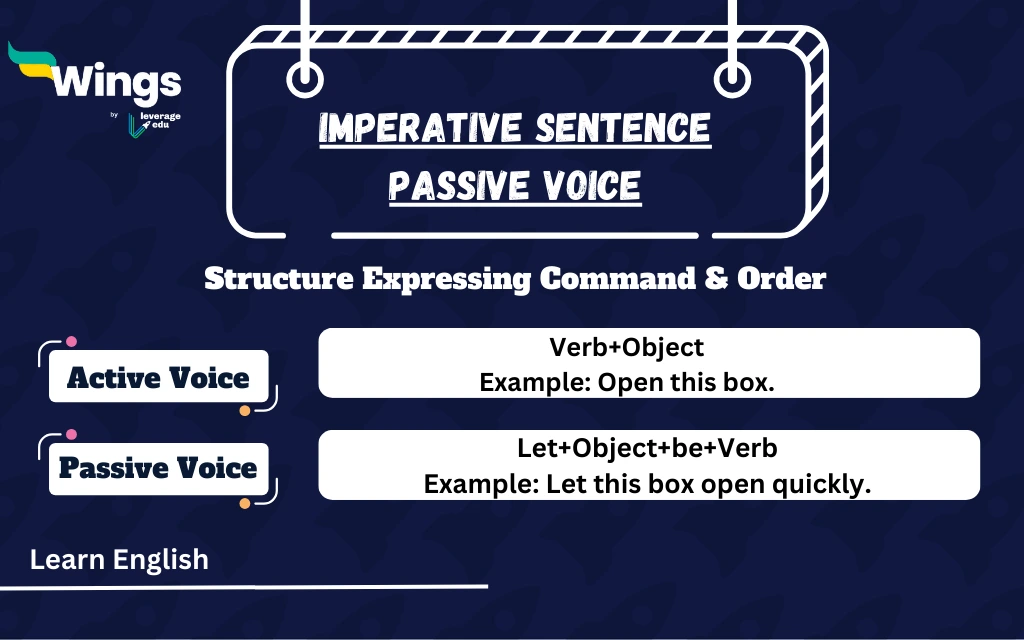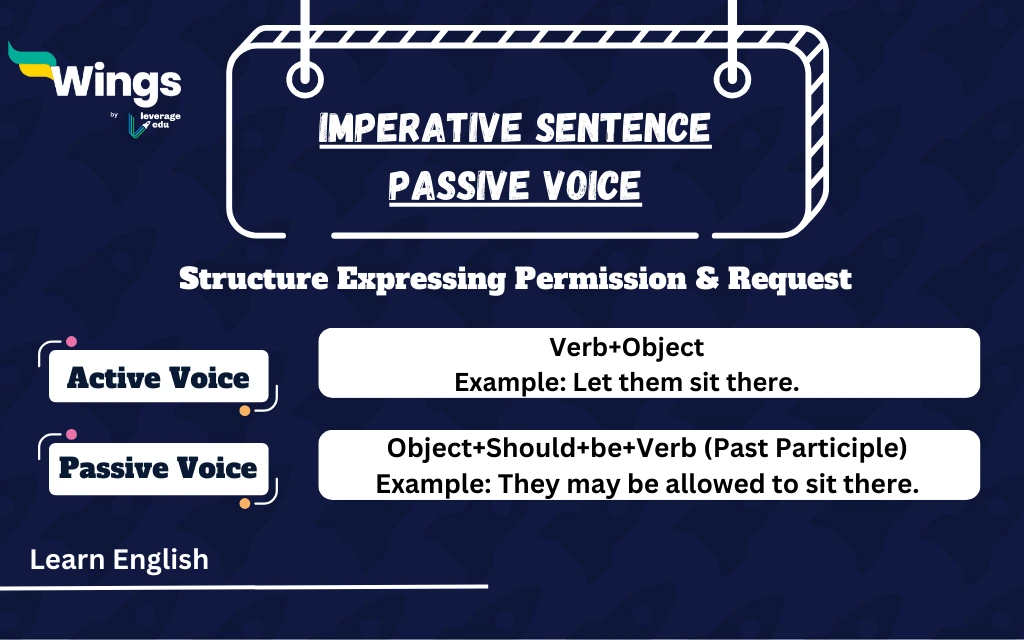Imperative Sentence Passive Voice: Sometimes, you feel like a piece of the puzzle is missing when certain active and passive voice rules do not apply to all types of sentences. If that is so, you might be dealing with imperative sentences, infamous for suggesting a command or requests. While these sentences follow a structure with the base form of the verb, followed by the subject or object, there is more to unravel when you study them as Imperative Sentences in Passive Voice via this blog. So, without further ado, read this blog article and learn more about the passive voice for imperative sentences, its rules and examples to boost your grammatical knowledge.
This Blog Includes:
Also Read: Best English Grammar Books: To Master Your Proficiency
What is an Imperative Sentence Passive Voice?
By now you may have noticed that imperative sentence passive voice is a grammatical construction that combines the features of imperative sentences and passive voice. It specialises in giving instructions or commands more indirectly or formally.
| For example: Submit your papers by Friday [Active Voice] Let the papers be submitted by Friday [Passive Voice] |
Also Read: Active and Passive Voice Rules for All Tenses [PDF Available]
Imperative Sentence Passive Voice Rules
The rules to change an imperative sentence into a passive voice are quite simple and achievable with the following formula.
1. Sentences Expressing Command and Order
| Types of Voice | Imperative Sentence Formula |
| Active Voice | Verb + Object |
| Example | Bring a Chair (Command) Do this quickly (Order) |
| Passive Voice | Let + Object + be + Past Participle (V3) |
| Example | Let a chair be brought (Command) Let this be done quickly (Order) |

2. Sentences for Permission, Request or Advice
| Types of Voice | Imperative Sentence Formula |
| Active Voice | Verb + Object |
| Example | Let them walk there. (Permission) Please help me. (Request) Prepare for the exam. (Advice) |
| Passive Voice | Object + Should + be + Past Participle (V3) |
| Example | They may be allowed to walk there. (Permission) You are requested to help me. (Request)You should be prepared for the exam (Advice) |

Imperative Sentence Passive Voice Examples
If the above-mentioned rules sound a little complicated, go through the following imperative sentence passive voice examples and gain confidence over voices like never before.
| Type of Imperative | Active Voice Example | Passive Voice Example |
| Direct Imperative | Shut the windows. | Let the windows be shut. |
| Requestive Imperative | Please clean the kitchen. | Let the kitchen be cleaned, please. |
| Prohibitive Imperative | Don’t touch the equipment. | Let the equipment not be touched. |
| Advisive Imperative | Keep the door closed. | Let the door be kept closed. |
| Instructive Imperative | Write the report. | Let the report be written. |
| Permissive Imperative | Allow her to enter. | Let her be allowed to enter. |
| Suggestive Imperative | Consider the possibilities. | Let the possibilities be considered. |
| Directive Imperative | Read the book. | Let the book be read. |
| Hypothetical Imperative | Take this medicine. | Let this medicine be taken. |
| Interrogative Imperative | Would you please close the door? | Could the door please be closed? |
Also Read: Voice Change Exercise For Class 7
Imperative Sentence Passive Voice Exercise with Answers
Let’s see how far you have come with your learnings through the following practice exercise. Try to solve as many as you can and check your answers from below to see how many you have got right.
Exercise: Rewrite the following imperative sentences in the passive voice. Answers are provided below each original sentence:
- Paint the entire room in a vibrant shade of blue.
- Do not disclose this information to anyone outside the team.
- Please sign the document before leaving the premises.
- Keep all valuable items securely locked in the safe.
- Review the proposal thoroughly before submitting it to the committee.
- Ensure that the windows are closed and locked before leaving.
- Allow the guests to access the restricted area only with authorized personnel.
- Reserve a table for two near the window, if possible.
- Consider the implications of the decision before making any announcements.
- Present your findings to the board during the meeting tomorrow.
Check Your Answers
- Let the entire room be painted in a vibrant shade of blue.
- Let this information not be disclosed to anyone outside the team.
- Let the document be signed before leaving the premises, please.
- Let all valuable items be securely locked in the safe.
- Let the proposal be thoroughly reviewed before submitting it to the committee.
- Let the windows be closed and locked before leaving.
- Let the guests be allowed to access the restricted area only with authorized personnel.
- Let a table for two near the window be reserved, if possible.
- Let the implications of the decision be considered before making any announcements.
- Let your findings be presented to the board during the meeting tomorrow.
Explore more exciting reads below:
FAQs
An imperative sentence is a type of sentence that gives a command, makes a request, or expresses a wish. It usually doesn’t have a specific subject because the subject is implied to be “you.”
An example of imperative sentence: Wash the dinner plates for today.
The imperative word is used to describe an action a speaker or writer wants someone else to do.
Yes, imperative sentences can be changed into passive voice, but the structure is a bit different from typical passive voice sentences.
The word “let” is used to introduce the passive voice construction in imperative sentences. It helps to soften the command or request and make it more polite.
This was all about the Imperative Sentence Passive Voice. Hopefully, you understood the usage of the voice. To read more voice blogs, follow Leverage Edu.


 One app for all your study abroad needs
One app for all your study abroad needs












 60,000+ students trusted us with their dreams. Take the first step today!
60,000+ students trusted us with their dreams. Take the first step today!
1 comment
Have found the article very helpful and informative.